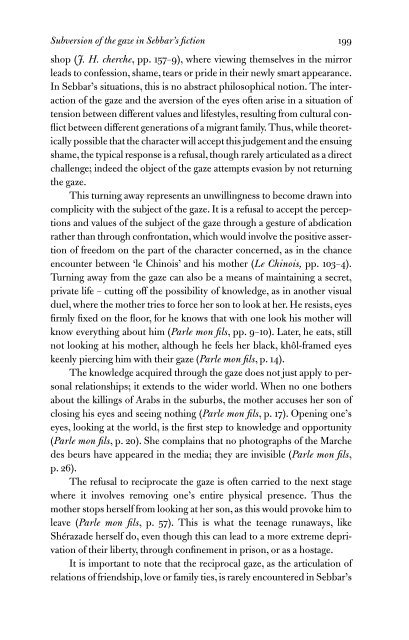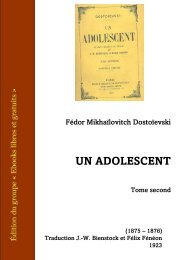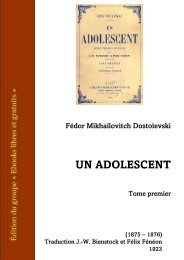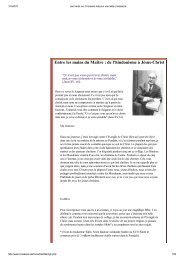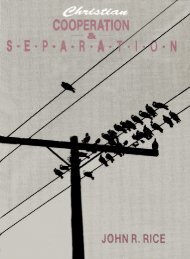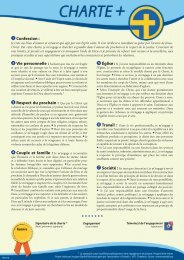Women writing in contemporary France
Create successful ePaper yourself
Turn your PDF publications into a flip-book with our unique Google optimized e-Paper software.
Subversion of the gaze <strong>in</strong> Sebbar’s fiction 199<br />
shop (J. H. cherche, pp. 157–9), where view<strong>in</strong>g themselves <strong>in</strong> the mirror<br />
leads to confession, shame, tears or pride <strong>in</strong> their newly smart appearance.<br />
In Sebbar’s situations, this is no abstract philosophical notion. The <strong>in</strong>teraction<br />
of the gaze and the aversion of the eyes often arise <strong>in</strong> a situation of<br />
tension between different values and lifestyles, result<strong>in</strong>g from cultural conflict<br />
between different generations of a migrant family. Thus, while theoretically<br />
possible that the character will accept this judgement and the ensu<strong>in</strong>g<br />
shame, the typical response is a refusal, though rarely articulated as a direct<br />
challenge; <strong>in</strong>deed the object of the gaze attempts evasion by not return<strong>in</strong>g<br />
the gaze.<br />
This turn<strong>in</strong>g away represents an unwill<strong>in</strong>gness to become drawn <strong>in</strong>to<br />
complicity with the subject of the gaze. It is a refusal to accept the perceptions<br />
and values of the subject of the gaze through a gesture of abdication<br />
rather than through confrontation, which would <strong>in</strong>volve the positive assertion<br />
of freedom on the part of the character concerned, as <strong>in</strong> the chance<br />
encounter between ‘le Ch<strong>in</strong>ois’ and his mother (Le Ch<strong>in</strong>ois, pp. 103–4).<br />
Turn<strong>in</strong>g away from the gaze can also be a means of ma<strong>in</strong>ta<strong>in</strong><strong>in</strong>g a secret,<br />
private life – cutt<strong>in</strong>g off the possibility of knowledge, as <strong>in</strong> another visual<br />
duel, where the mother tries to force her son to look at her. He resists, eyes<br />
firmly fixed on the floor, for he knows that with one look his mother will<br />
know everyth<strong>in</strong>g about him (Parle mon fils, pp. 9–10). Later, he eats, still<br />
not look<strong>in</strong>g at his mother, although he feels her black, khôl-framed eyes<br />
keenly pierc<strong>in</strong>g him with their gaze (Parle mon fils,p.14).<br />
The knowledge acquired through the gaze does not just apply to personal<br />
relationships; it extends to the wider world. When no one bothers<br />
about the kill<strong>in</strong>gs of Arabs <strong>in</strong> the suburbs, the mother accuses her son of<br />
clos<strong>in</strong>g his eyes and see<strong>in</strong>g noth<strong>in</strong>g (Parle mon fils,p.17). Open<strong>in</strong>g one’s<br />
eyes, look<strong>in</strong>g at the world, is the first step to knowledge and opportunity<br />
(Parle mon fils,p.20). She compla<strong>in</strong>s that no photographs of the Marche<br />
des beurs have appeared <strong>in</strong> the media; they are <strong>in</strong>visible (Parle mon fils,<br />
p. 26).<br />
The refusal to reciprocate the gaze is often carried to the next stage<br />
where it <strong>in</strong>volves remov<strong>in</strong>g one’s entire physical presence. Thus the<br />
mother stops herself from look<strong>in</strong>g at her son, as this would provoke him to<br />
leave (Parle mon fils, p.57). This is what the teenage runaways, like<br />
Shérazade herself do, even though this can lead to a more extreme deprivation<br />
of their liberty, through conf<strong>in</strong>ement <strong>in</strong> prison, or as a hostage.<br />
It is important to note that the reciprocal gaze, as the articulation of<br />
relations of friendship, love or family ties, is rarely encountered <strong>in</strong> Sebbar’s


